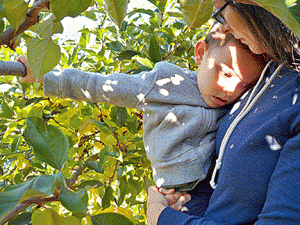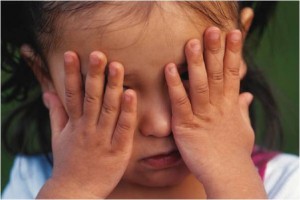
Sensory Sensitivity in Infants Can Strain Parent-Child Relations
“For a child that has sensory hypersensitivity, every touch is painful. A hug is perceived as a painful gesture.”
So says Yael Ohri, a preschool teacher who specializes in identifying and alerting parents to potential issues their children may have with sensory sensitivity.
Sensory sensitivity is an important concern for some children and their parents. Low sensory thresholds characterize sensory hypersensitivity, in which any touch or experience can overwhelm the child, while sensory hyposensitivity occurs when a child is “under-sensitive” to stimuli.
Ohri was trained by clinical-developmental psychologist Rami Katz at Tel Aviv University, who trains professionals who work with children, in the Neuro-Developmental & Functional Approach (NDFA). Developed by Katz, NDFA aims to address early developmental issues by targeting the underlying source of the problem, rather than the external manifestations like the behavioural and learning difficulties resulting from sensory sensitivity.
Sensory hypersensitivity comes in various forms as it may be experienced through any of the five senses: sight, hearing, touch, smell, or taste. Ohri states that “a child’s skin may be so sensitive that she might complain that the tag in the back of the shirt, or the stitching in the socks is bothersome. Every little thing is experienced so intensely in a way that a child with normal sensitivity would not feel at all.”
Also of concern, over- or under- sensitivity in children can negatively affect the formation of attachment between parent and child.
As Ohri explains, “imagine a new mother who gives her baby a bath, and throughout the duration of the bath, the baby does not stop screaming, it can be very frustrating. The mom may blame herself and say, ‘I’m such a terrible mother, I can’t even bathe my baby,’ or worse, she may get angry with her baby for acting up and proclaim, ‘my baby hates me,’ causing an attachment issue right off the bat.”
To help young children struggling with average intensity stimuli, occupational therapists may stimulate the child’s skin with different brushes that allow the body to moderate the sensory input.
This, as well as other techniques, is designed to help sensory sensitivity. Still, Ohri believes that a critical element of treatment is simple awareness.
“It is essential that parents understand their child’s hyper- or hypo- sensitivity, and that it’s not something that the child is doing to them on purpose.” By raising early awareness, the issue is addressed when it is still relatively easy to treat. Ohri views it as much worse when the issue is not targeted early, leading to fights and stress in the family, as well as parents labelling the child as having a personality problem.
A sensory hyper-sensitive child may be labelled as irritable or whiny. Similarly, a hypo-sensitive child, who tends to be rougher, does so “not because he’s doing it on purpose, but instead, because he needs to hold and feel you and in order to do that, he does so more strongly. This kind of child is often labelled as violent.”
The problem is that this type of labelling can result in a self-fulfilling prophecy where the child ends up thinking of himself as difficult or rude, identity characteristics that become difficult to break free of later on.
Ohri argues that awareness helps. “Once parents become aware that the child has a sensory sensitivity, and begin asking themselves the right questions about the child’s day-to-day behaviours, they learn to alter their interaction with their child in order to avoid conflicts.”
Does simply being aware solve the problem altogether? No, but it’s a start.
“It doesn’t necessarily mean that the child stops being sensitive, but it helps moderate the difficulties and makes the child’s environment more understanding. This applies to both the child and the family. As both sides become more aware, living with sensory sensitivity becomes more tolerable. Mothers are amazing, if they are made aware, they find the solution.”
But what about parents who struggle with their own mental health? Parents dealing with personal trauma may find it harder to perceive signals coming from their child and may interpret them inaccurately.
According to developmental psychologist, Sarah Landy, at the Hincks-Dellcrest Centre in Toronto, parents who don’t have their personal needs met due to past trauma, find it difficult to emotionally connect with their children and respond sensitively to their needs. “When parents are unavailable due to trauma,” says Ohri, “awareness alone won’t do the trick, since the parents might not be able to get there on their own.”
So, parents who work toward resolving their own struggles with mental health will likely become better attuned to their children’s cues and respond to them more sensitively.
Sensory hyper- and hypo-sensitivity can be resolved relatively easily when targeted early, but can become a more complex issue when ignored or treated incorrectly, or when parents are not emotionally available to notice the problem.
Through the difficulties, Ohri emphasizes, “awareness is key.”
–Noam Bin-Noon, Contributing Writer





